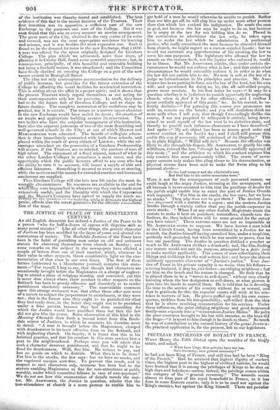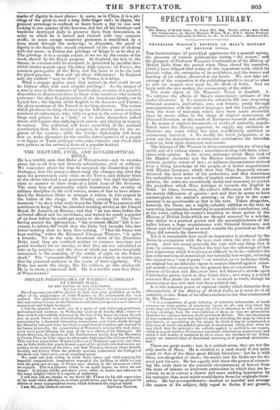PECULIAR PRIVILEGES OF ROYALTY IN FRANCE. WHEN Henry the Fifth
dilated upon the troubles of the kingly estate, and asked,
" What have kings, that privates have not too,
Save ceremony, save general ceremony?" be had not been King of France, and still less had be been "King of the French." Had he attained that highest dignity of modern times, the highest post in the highest of civilized nations, he would have learned that it is among the privileges of Kings to be shot on high days and holydays—unless, indeed, the privilege comes within the category of the " general ceremony." The assassin seems almost to form part of the royal household in France, as it has done in some Eastern courts ; only it is to be used not against the King's enemies, but against the King himself. There are peculiar Save ceremony, save general ceremony?" be had not been King of France, and still less had be been "King of the French." Had he attained that highest dignity of modern times, the highest post in the highest of civilized nations, he would have learned that it is among the privileges of Kings to be shot on high days and holydays—unless, indeed, the privilege comes within the category of the " general ceremony." The assassin seems almost to form part of the royal household in France, as it has done in some Eastern courts ; only it is to be used not against the King's enemies, but against the King himself. There are peculiar marks of dignity in most places: in some, as in China, it is a pri- vilege of the great to wear a long little-finger nail ; in Japan, the greatest personage is confined so many hours a day to one seat looking to one quarter of the heavens, and has all his furniture and Wardrobe destroyed daily to preserve them from desecration, in order to which he is served and clothed with very common stuffs; in some savage countries greatness is manifested by a bone stuck through the under-lip ; in Abyssinia, the proof of dignity is the having the mouth crammed to the point of choking with raw meat ; in France the privilege of Kings is to be shot at. The privilege is to a certain extent, as we see by the events of the week, shared by the Royal progeny. In England, the heir to the throne, in common with its occupant, is protected by peculiar laws which render assault upon his safety high treason : in France, the common prerogative of the King and his heirs is to be the butt for pistol-practice. How odd are these differences 1 In England only dry rubbish "may be shot" ; in France it is kings.
What a strange genius must that nation's be that could invest its highest office with such singular privilege ! As the temper of a man is seen in his moments of intoxication, so some of a people's disposition is discovered alone in those of its members who commit excesses : the ultra Republicanism of the Americans breaks out in Lynch-law ; the bigotry of the English in its AGNEWS and Timms; the glory-madness of the French in its king-shooters. The nation which produces its king-shooters by the half-dozen must comprise numbers of enthusiasts, who, without going to the extent of killing kings and princes for a "lark," or to make themselves talked about, still hanker after dallying with pistols and playing at tragedy in earnest. The politician will learn something of the national constitution from this morbid symptom, in providing for the re- gimen of the country ; while the foreign diplomatist will know bow to make allowance for the warlike extravagancies of a people —in Egypt or Tunis perhaps—who raise emeutes and shoot their Own princes as the crowning feats of a popular festival.



























 Previous page
Previous page